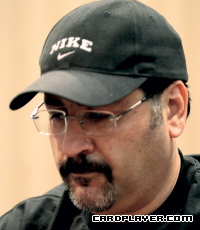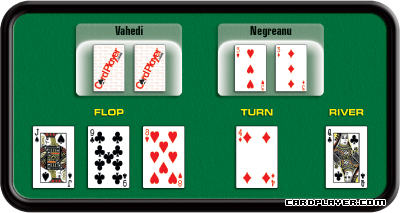I came into day two feeling comfortable with my stack sitting at $42,925. In these big
World Poker Tour events, you can't worry too much about where your stack is in relation to the average; instead, your focus should be on where you are sitting in relation to the blinds and antes.
In the early going, I was doing rather well and continued to chip-up safely without any all-in confrontations, and was able to just about double my stack before the following hand:
With the blinds at $600-$1,200 with a $200 ante, I raised to $2,800 from middle position with pocket threes. Amir Vahedi was in the big blind and called, which I figured he would do. Amir is a good player and isn't about to let me steal his blind for an additional $1,600.
The flop came J-9-8 rainbow and Amir checked to me. Obviously, I wasn't a big fan of this flop, so I decided to check, also. The turn card was a 4, and this time Amir bet $3,500. Something about his bet didn't ring true to me. It felt like a complete bluff, one that definitely didn't include a pair. The way that Amir had been playing during most of the afternoon, I thought that if he did have a pair, he would have been happy to check it down and look to play a small pot. I wasn't sure, obviously, but I decided to call and see what developed on the river.

The river was a queen, for a final board of J-9-8-4-Q. I had somehow found a way to stay in until the river with my threes. Now, on the river, Amir fired another bullet, this time betting $7,000.
When he made the bet, as strange as it sounds, I actually thought I had a chance to win the pot. Had he checked, I would have assumed that he had at least a pair, but when he bet such a scary river card, it became a situation in which he had to have the straight or two napkins (a term that Jennifer Harman coined to describe absolutely nothing; after losing a pot on the river, Jennifer said, "What do you think I raised with, two napkins?")
The more I thought about it, the more I thought Amir had to have two napkins. I knew that he would call my preflop raise with a wide variety of hands, so he could have absolutely anything at this point. For him to bet, though, I ruled out any marginal hands like a pair, or even two pair, for that matter.
I finally decided to look him up and called the $7,000. Almost instantaneously, Amir's hand hit the muck. What he had exactly, I'll never know, but I'm guessing that he may have had a hand like A-6 or something along those lines.
I, of course, showed my "big pair" proudly and raked in a nice pot that put me over the $100,000 mark for the first time in the tournament. Making a big call like that with a measly pair of threes is akin to bruising someone's manhood. It's like sending the message, "I'm in your head, so don't mess with me."
It can give you such a powerful psychological edge over a particular opponent that it should be part of your thought process when you make very thin calls like this one. If you are really unsure of what to do, and are debating making a courageous call with a weak hand, try to factor in not only what winning the pot will do for your own confidence, but also what it will do to your opponent's psyche.
After making that call, my confidence was pretty high and I believed that I'd end the day in good chip position and make a run to the final table. Before the night was over, though, Amir bounced back in a couple of pots against me and regained his composure and most of the chips he'd lost to me on that hand. Both Amir and I made it through the day. I ended day two with $120,700, which put me in good shape. With an amazing structure, thanks to the tournament directors in Tunica, if you were at or even near the average, you still had more than enough play left so that you wouldn't feel that you were in a desperate position.











